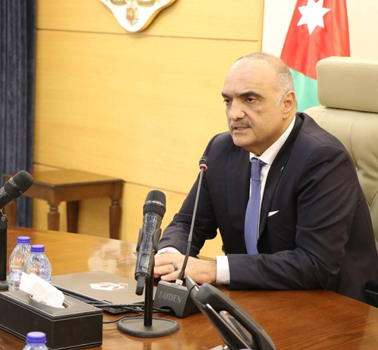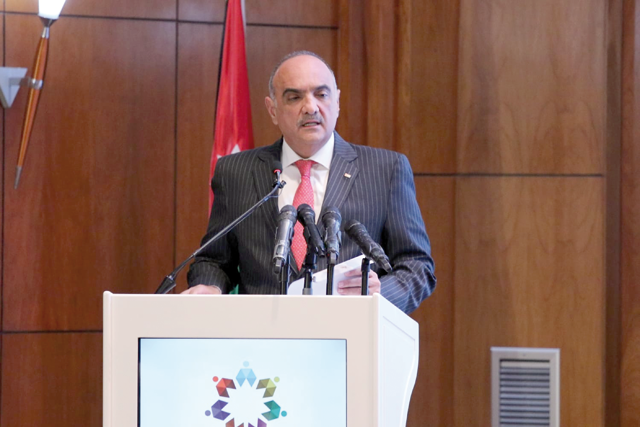You are here
PM welcomes new ministers after Cabinet reshuffle
By JT - Oct 27,2022 - Last updated at Oct 27,2022

Prime Minister Bisher Khasawneh chairing a Cabinet session following the Royal Decree approving a government reshuffle on Thursday (Petra photo)
AMMAN — The Cabinet on Thursday held a session chaired by Prime Minister Bisher Khasawneh following the Royal Decree approving a government reshuffle.
Khasawneh thanked outgoing ministers for their efforts, and wished new ministers success in carrying out their duties and tasks, the Jordan News Agency, Petra, reported.
The prime minister said that the fifth reshuffle comes almost two years after forming the government, which has implemented several of the tasks mentioned in the Letter of Designation, mainly with regards to the COVID-19 pandemic response.
He also noted that the government was formed during a period of several constitutional entitlements after the end of the 18th Parliamentary term. At the same time, the government was being formed as the Independent Election Commission (IEC) was tasked with holding parliamentary elections on their constitutionally-specified date. The formation also occurred during an endorsement of the first general budget, per an agreement with the International Monetary Fund (IMF) to speed up structural economic reforms.
Khasawneh said that as the Jordanian state entered its second centennial, it adopted a comprehensive reform course comprised of three main elements: Modernising the political system, the Economic Modernisation Vision and the roadmap to modernise the public sector.
The prime minister said that the political modernisation element included the endorsement of elections, laws related to political parties and relevant constitutional amendments, in addition to legislative amendments regarding the essential task of empowering women and youth.
He also expressed his happiness at the increase in female representation in the Council of Ministers, as the new government now features five female ministers and/or ministers of state. These women, he noted, were selected based on their capabilities, efficiency and demonstrated excellence, rather than for the purpose of fulfilling a gender quota.
As for the Economic Modernisation Vision, the premier stressed that this element includes realistic and achievable targets. Such goals include the provision of one million jobs and achieving an economic growth rate of 5.5 per cent within the next decade, and empowering the private sector to find solutions to poverty and unemployment.
Khasawneh pointed out that in today’s reshuffle, the public sector modernisation roadmap was assigned to a deputy prime minister and minister of state. This, he noted, indicates the importance of this path as a “fundamental lever” of the country’s economic trajectory, which largely overlaps with political life.
He stressed that if the issues within the public sector are not resolved quickly, and if citizens and the private sector remain unaffected by the modernisation plan, the government will find it very difficult to proceed with the other two aspects of the country’s comprehensive reform efforts.
Khasawneh said that this reshuffle was intended to reduce the number Cabinet members, even on a small scare. The Cabinet, which now has 27 ministers, also featured a consolidation of roles, with the ministries of public works and transport tasked to one minister. The Ministry of Labour and Industry, as well as the Ministry of Trade, were likewise delegated to one minister.
As for the Ministry of Government Communication, Khasawneh said that it aims at increasing the efficiency of media messages of the state and to communicate with the new digital media and traditional media to become more effective in promoting achievements.
In order to increase the efficiency of state media messages, enhance communication with both new and old media and effectively promote governmental achievements, the new Ministry of Government Communication was formed, according to the premier.
Related Articles
AMMAN — The Cabinet, on Wednesday, during a session chaired by Prime Minister Bisher Khasawneh, approved the administrative organisation of
AMMAN — The government has begun implementing the public sector modernisation roadmap, which is regarded as the "main lever" for the economi
AMMAN — After briefing His Majesty King Abdullah on the recommendations of the Committee to Modernise the Public Sector, the governmen

















